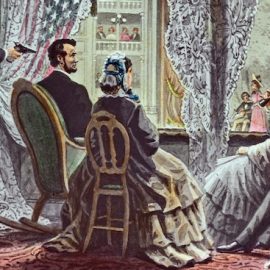

This article is an excerpt from the Shortform book guide to "Why We're Polarized" by Ezra Klein. Shortform has the world's best summaries and analyses of books you should be reading.
Like this article? Sign up for a free trial here.
Who were the Dixiecrats? How does their story shed light on the transformation of the Democratic Party in the 20th century?
Ezra Klein writes that, in the mid-20th century, conservative Southern Democrats were the heart of the Democratic Party. He examines the history of these “Dixiecrats” and explains the significant role they played in American politics.
Read more to learn how and why Dixiecrats dominated—and then exited—the Democratic Party.
The Dominance of the Dixiecrats
Klein writes that, to understand America’s mid-20th century era of bipartisan comity—and how it ended—we need to understand the Dixiecrats. Just who were the Dixiecrats? These conservative, white, segregationist Southern Democrats were the backbone of the Democratic Party from the 19th through the mid-20th century. Through their domination of Southern politics, they established a system of authoritarian, one-party rule in the South. Supporting this system was a range of suppressive tactics, ranging from legal disenfranchisement to intimidation, segregation, and violence against African Americans. Klein argues that maintaining this system of racial hierarchy was the chief political goal of the Dixiecrats.
Because they were critical to giving the overall majority to the Democratic Party in Congress, Dixiecrats had great influence in Democratic politics at the national level. And the national Democratic Party—which generally became more progressive and egalitarian in the 20th century—had little choice but to placate its Dixiecrat partners by turning a blind eye to the system of racial apartheid in the South. In practice, Klein writes, this meant that liberal Democrats who wanted to get anything done at the national level—from establishing Social Security and Medicare to passing pro-union legislation—had to accommodate the Dixiecrats.
(Shortform note: Despite their differences with liberal Democrats on racial issues, Southern Democrats did reliably support the party’s major pieces of social legislation throughout much of the 20th century. Dixiecrats voted overwhelmingly for the Social Security Act of 1935 and to establish Medicare in 1965. Southerners in important leadership positions in both houses of Congress guided these legislative milestones to passage.)
| Patronage and the Republican Party in the South The Southern Democrats so thoroughly established a one-party system in the South during this time that scholars argue the Republican Party ceased to exist at all in the South from the end of the Reconstruction Era to the mid-20th century. However, the national Republican Party still had an interest in keeping local Southern party organizations alive. This was because a significant percentage of GOP delegates to the quadrennial national convention—where the party’s presidential nominee was selected—were still allocated to the South. And aspiring Republican presidential candidates found the Southern Republican delegates highly useful in securing the nomination. These delegates supplied crucial votes at the nominating convention but represented few actual voters. Instead, their state organizations consisted of only a handful of local party bosses. As such, Republican presidential candidates found it easy and cost-effective to buy off the Southern delegates with promises of coveted federal jobs, in exchange for their support at the convention. |
The Departure of the Dixiecrats
Klein writes that the partnership between the Dixiecrats and the rest of the Democratic Party began to change in the mid-20th century as the liberal wing of the Democratic Party began to more aggressively and boldly support civil rights legislation.
The enactment of the 1964 Civil Rights Act and the 1965 Voting Rights Acts (passed by a Democratic Congress and signed by Democratic President Lyndon Johnson) were watershed moments in American political history. The Democrats were now the national party of civil rights, which deeply alienated the Dixiecrat wing of the party.
This, observes Klein, was the beginning of the great ideological reshuffling of the two parties, as conservative white Southerners started their long exodus from the Democratic Party into the Republican Party. The GOP proved a welcome home for them, as the former Dixiecrats—alarmed by the threat of federal desegregation efforts—suddenly found the anti-government ideology of conservative Republicans highly appealing.
| The “Southern Strategy” In How Democracies Die, Levitsky and Ziblatt write that Republican politicians like Richard Nixon and Ronald Reagan actively welcomed and encouraged the flight of white Southern voters out of the Democratic Party. GOP strategists like Lee Atwater engineered a “Southern Strategy,” in which Republican candidates railed against school integration, excessive welfare spending, and urban crime. The authors argue that these were racially coded appeals: At face value, they appeared to be race-neutral, but they were designed to evoke white voters’ fears of and resentments toward African Americans. In a 1981 audio recording, Atwater described how this rhetoric would enable Republicans to stoke white racial resentment while giving politicians and voters plausible deniability that there was any racial malice at play. However, in 2005, then-Republican National Committee Chairman Ken Mehlman apologized for the party’s exploitation of racial hostilities for its political benefit in an address to the NAACP. |

———End of Preview———
Like what you just read? Read the rest of the world's best book summary and analysis of Ezra Klein's "Why We're Polarized" at Shortform.
Here's what you'll find in our full Why We're Polarized summary:
- Why bipartisan cooperation is becoming increasingly difficult in the US
- The origins of modern political polarization and its impacts on the parties
- Ideas for how we might depolarize our politics






